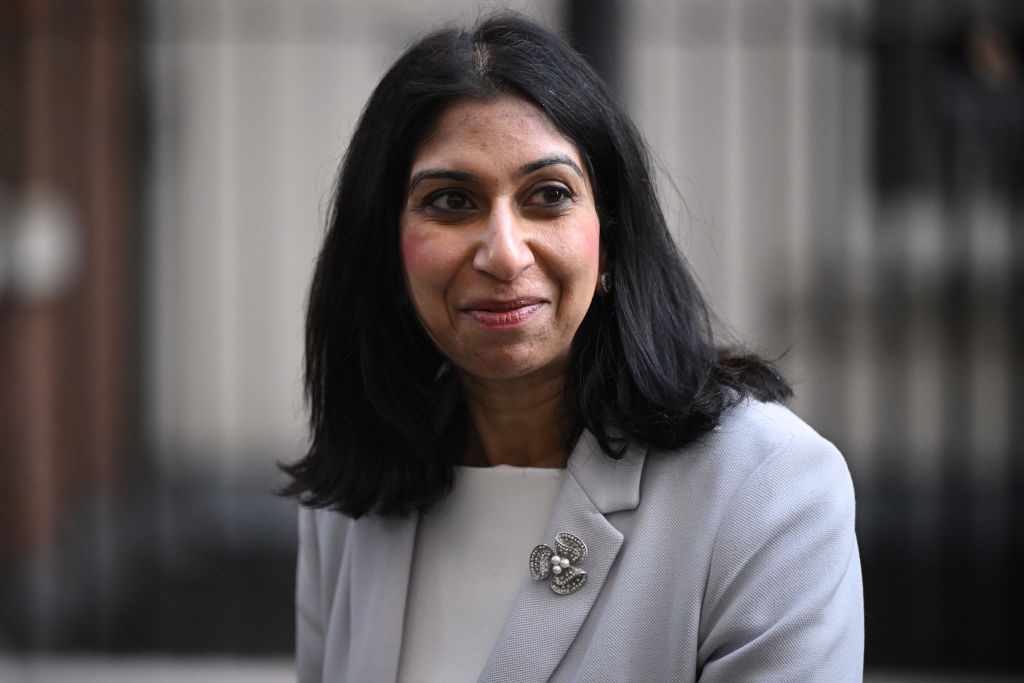It is understandable that Suella Braverman has swiftly written to chief constables demanding them to take a tough line on potentially anti-Semitic protests. She pointed out that while it was true that explicitly supporting Hamas, a proscribed terrorist body, was ipso facto a crime, the police could go much further in discouraging demonstrations of this kind. Waving a Palestinian flag could in suitable circumstances be taken as amounting to a glorification of terrorism, another serious offence; the mere act of chanting ‘from the river to the sea, Palestine will be free’ might in some cases be a public order crime; and so on. And, she added, something had to be done about what people were saying on the internet. Online offending, she said, ‘is as serious as offline offending’.
Understandable, certainly. But Braverman still needs to tread carefully. In cases like this, where decent people’s sympathy lies entirely with her and the demonstrators’ position could hardly be more meritless, it remains worryingly easy to end up with a cure that is worse than the disease.
For one thing, whatever her position as a political home secretary, when wearing her hat as policing minister she needs to give at least the appearance of neutrality. While her letter was clearly drafted in a hurry, it would have been much better had it not taken the appearance of an instruction to come down heavily on anti-Israel speech.
Suella Braverman’s letter was probably well meant. But it sets an unwise precedent
Secondly, however vile the views being publicised, calling for a general clampdown on their expression, including in this case a de facto ban on certain forms of words and the flying of a particular flag because of what they might signify, carries its own dangers.
As it is, the potential restrictions on speech in the UK arising from the Public Order Act, the terrorism laws and other assorted legislation are already very wide. It is not too far off the mark to say that any forthright expression of views that offended anyone could at a pinch be criminalised by a determined prosecutor, and could almost certainly justify an arrest. But this is not something we should draw attention to. However unprepossessing this week’s Palestinian apologists, we don’t want to give too many ideas to a home secretary under a future administration faced with, say, noisy protests against trans activists, or vociferous protests against state visits from countries like India, China or Saudi Arabia at a time when the government wishes to roll out the red carpet. We could well end up with a creeping truncation of any right to mount an effective protest against anything the government supported.
And all this is without Braverman’s call for strict measures against material appearing online. We already have a problem of the disproportionate time spent by police trawling the net and pouncing on social media posts that annoy particular interest groups. Witness, for example, a series of prosecutions for minor online matters such as insulting the memory of Sir Tom Moore or displaying videos of dogs performing Nazi salutes, and – more worryingly – instances of people being put through the criminal courts, and in some cases imprisoned, for the entirely private sharing of material seen as racist or sexist. Whatever you think of the pro-Palestinian protesters, the last thing we need is the police being given the green light to act, and the state to prosecute, whenever someone snitches about the existence of private WhatsApp groups devoted to the exchange of extreme political views.
If not calling for chief constables to get tough, what should we be doing? Oddly enough, the latest events could give an excellent opportunity to the government, both to strike a blow for free speech and to come down hard on those who seriously deserve it.
For egregious pro-Hamas tirades, there are ample legal sanctions. The crimes that can be charged range from expressing support for or displaying the symbols of a terrorist group, through glorifying acts of terrorism, up to incitement to murder in cases of direct calls for Hamas’s excesses to be repeated. Again, in so far as Jews or others have been deliberately intimidated or put in fear in the street, the offences of violent disorder and intentional harassment are ideally placed. These sanctions need to be used, and used hard.
On the other hand, for matters falling short of this, and certainly for most online matters not directly inciting people to violence, there is a strong case for a hands-off approach, whether or not there are technical grounds for prosecution. The government would gain a great deal of credibility if it took the line that, once we have dealt with the outrageous, even the vile are entitled to air their views and be criticised accordingly.
Suella Braverman’s letter was probably well meant. But it sets an unwise precedent.






Comments